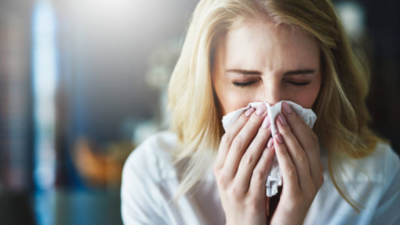Hay Fever vs. COVID-19: Key Differences

Spring brings pollen and with it, hay fever. But these days, a runny nose or sneezing can make you wonder if it’s hay fever or something more serious like COVID-19.
Hay fever is an allergic response to pollen, dust mites, mold, or pet dander. It’s common from late March to September when pollen counts are high.
Early Symptoms
Both hay fever and COVID-19 can cause:
- A runny or blocked nose
- Sneezing
- Sore throat
- Tiredness
- Headache
- Cough
But the reasons and duration of these symptoms often differ.
COVID-19 Symptoms
COVID-19 affects the whole body. Early symptoms include feeling unwell, chills, muscle aches, and fatigue. Fever is common, and a sudden loss of taste or smell is a key sign of COVID-19.
COVID-19 symptoms usually come on quickly and worsen over 2-3 days. You might start with a sore throat or fatigue, and then develop a cough, fever, or worse.
Key signs it’s probably COVID-19:
- Sudden loss of taste or smell
- Fever or chills
- Body aches
- Shortness of breath
- Nausea or diarrhea
Symptoms appear suddenly and get worse over a few days.
Hay Fever Symptoms
Hay fever mainly affects your face. You’ll feel it in your eyes, nose, and throat. Itchy, watery eyes are a classic sign. Symptoms often follow a pattern, like being worse in the morning or triggered by being outdoors.
If it happens every spring or gets worse when you’re outside, it’s likely hay fever.
Key signs it’s probably hay fever:
- Itchy or watery eyes
- No fever
- Seasonal symptoms or triggered by being outdoors
- Improves with antihistamines
- Sneezing fits or nasal itching without body aches
The Sneeze Test
Both conditions can make you sneeze. But hay fever sneezes usually come in rapid succession. COVID-related sneezing is less common. If your sneezing is uncontrollable and paired with itchy eyes or ears, it’s likely hay fever.
Taste and Smell
If you suddenly lose your ability to taste or smell, but your nose isn’t blocked, it could be COVID-19.
With hay fever, your sense of smell and taste can be dull, but mostly because your nose is stuffed.
How to Be Sure
If you’re unsure, take a COVID-19 rapid antigen test. They’re quick and a good first step. Another trick is to try an over-the-counter antihistamine. If your symptoms improve in an hour or two, it’s likely hay fever. COVID-19 won’t respond to allergy meds.
Can You Have Both?
Yes, you can have COVID-19 and hay fever at the same time. If your allergies are flaring and you suddenly feel exhausted, feverish, or short of breath, don’t assume it’s just pollen. Test yourself, stay cautious, and isolate if needed.
If you deal with allergies every spring and your symptoms feel the same as last year, it’s probably hay fever. But if something feels different, especially with fatigue or fever, don’t wait. Test and stay safe.



